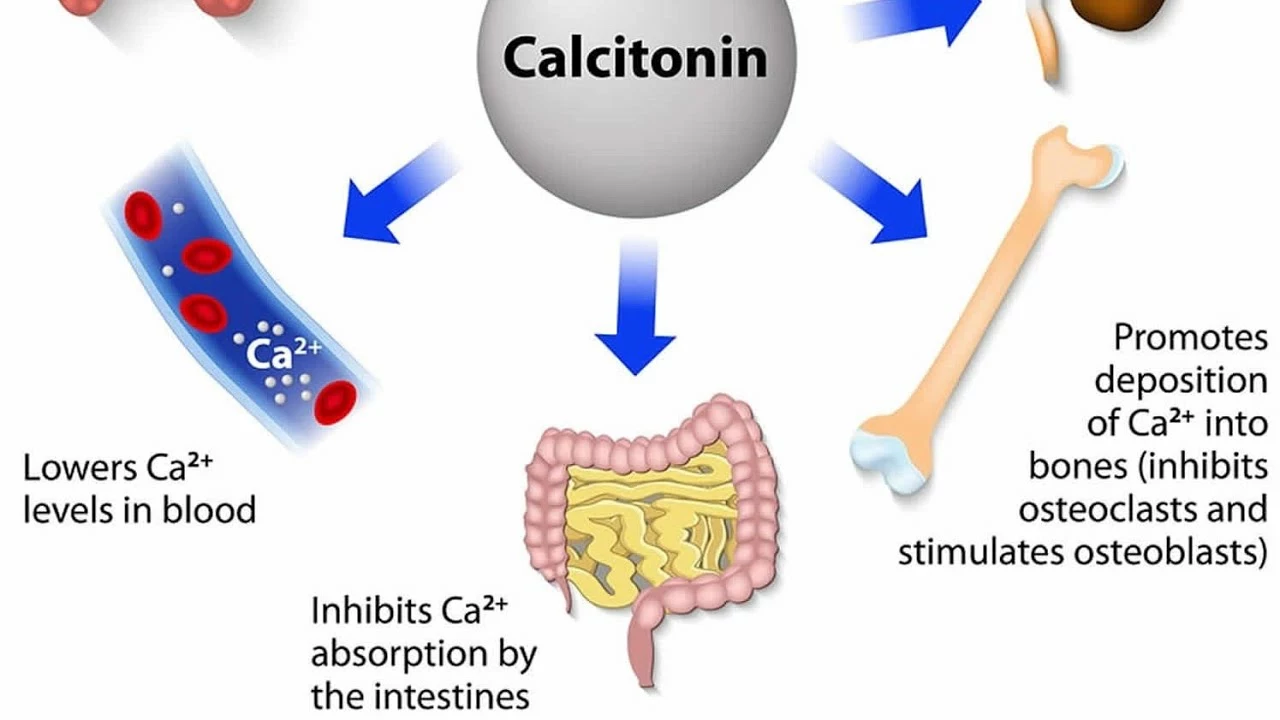The Power of Calcitonin: A Hormone's Role in Bone Health
As we dive deep into the world of bone health, one hormone that plays a significant role is calcitonin. Produced by the thyroid gland, calcitonin has a significant impact on bone cells and their functions. In this article, we will explore the various effects of calcitonin on bone health and how it plays a vital role in maintaining our skeletal system.
Calcitonin's Role in Bone Formation
Calcitonin is a hormone that is essential for the proper development and maintenance of our skeletal system. Its primary function is to regulate the levels of calcium and phosphate in our body. It does this by inhibiting the activity of osteoclasts, the cells responsible for breaking down bone tissue. This results in a decrease in the rate of bone resorption, which helps to maintain bone density and strength. In addition, calcitonin also promotes the differentiation and activity of osteoblasts, the cells that build new bone tissue. This ensures that our bones are constantly being repaired and renewed, helping to maintain their health and integrity.
Calcitonin and Bone Density
A crucial aspect of bone health is maintaining an optimal bone density. Bone density refers to the amount of mineral content in our bones, which determines their strength and resilience. Calcitonin plays an essential role in maintaining bone density by regulating the balance between bone formation and resorption. By inhibiting the activity of osteoclasts and promoting the activity of osteoblasts, calcitonin helps to ensure that our bones remain strong and sturdy, capable of supporting our body weight and withstanding the forces we encounter in our daily lives.
Calcitonin's Effects on Osteoporosis
Osteoporosis is a common bone disorder characterized by a decrease in bone density, which leads to an increased risk of fractures. Calcitonin has been shown to be an effective treatment for osteoporosis, as it helps to slow down the rate of bone loss and promote bone formation. This not only helps to maintain bone density but also reduces the risk of fractures, which can have severe consequences for individuals with osteoporosis. Additionally, calcitonin has also been found to have analgesic effects, providing pain relief for those suffering from osteoporotic fractures.
Calcitonin and Bone Metabolism
Calcitonin plays a crucial role in bone metabolism, which is the process by which bone tissue is constantly being broken down and rebuilt. This process is essential for maintaining bone health and ensuring that our skeletal system remains strong and functional. By regulating the activity of osteoclasts and osteoblasts, calcitonin helps to maintain the delicate balance between bone resorption and formation. This, in turn, ensures that our bones are constantly being renewed and repaired, helping to maintain their strength and integrity.
Calcitonin's Role in Calcium Homeostasis
Calcium is an essential nutrient for our body, and its levels must be tightly regulated to ensure proper functioning of various physiological processes. Calcitonin plays a vital role in calcium homeostasis by inhibiting the release of calcium from bone tissue. When calcium levels in the blood are high, calcitonin is secreted to promote the deposition of calcium in bone tissue, thereby reducing blood calcium levels. This helps to maintain the optimal balance of calcium in our body, which is necessary for healthy bones and overall well-being.
Calcitonin as a Therapeutic Agent
Given its numerous effects on bone health, calcitonin has been widely used as a therapeutic agent for various bone disorders. As mentioned earlier, calcitonin has been successfully used as a treatment for osteoporosis, helping to slow down the rate of bone loss and promote bone formation. Additionally, calcitonin has also been used to treat other conditions like Paget's disease, a disorder characterized by abnormal bone remodeling. By regulating the activity of osteoclasts and osteoblasts, calcitonin helps to restore the balance between bone resorption and formation, thereby improving bone health in these individuals.
Monitoring Calcitonin Levels for Optimal Bone Health
Given the importance of calcitonin in maintaining bone health, it is essential to monitor its levels in our body. Abnormal levels of calcitonin can indicate an underlying bone disorder or an imbalance in calcium homeostasis. By regularly monitoring calcitonin levels, healthcare professionals can detect and treat any potential issues, ensuring that our bones remain healthy and strong. Furthermore, maintaining optimal levels of calcitonin can also help to prevent the development of bone disorders like osteoporosis, ensuring that our skeletal system remains robust and functional throughout our lives.
Conclusion
In conclusion, calcitonin is a crucial hormone that plays an essential role in maintaining bone health. By regulating the activity of bone cells and promoting the balance between bone formation and resorption, calcitonin helps to ensure that our bones remain strong and resilient. Its various effects on bone metabolism, density, and calcium homeostasis make it an important therapeutic agent for numerous bone disorders. By understanding the influence of calcitonin on bone cells and their function, we can better appreciate the importance of this hormone in maintaining our skeletal system and overall well-being.





Comments (11)